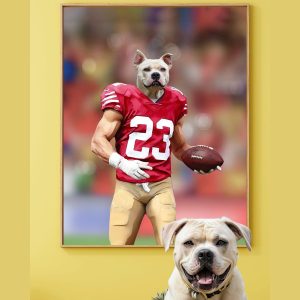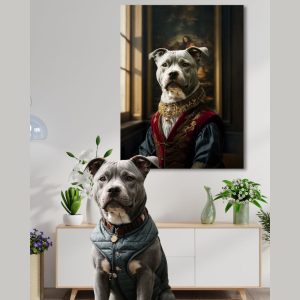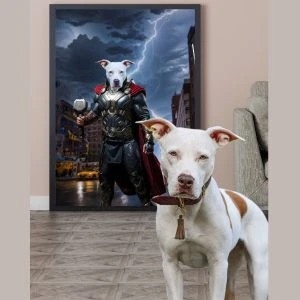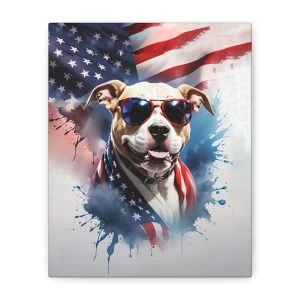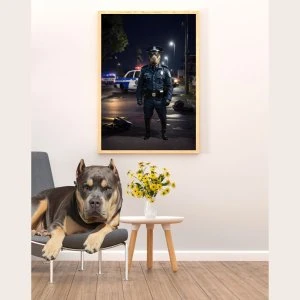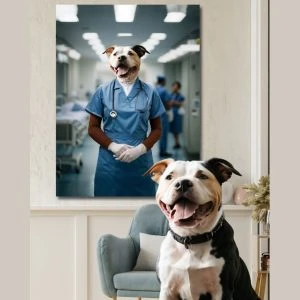Long Haired Pitbull
Can Pitbulls have long hair?
Yes, Pitbulls can have long hair. The term “pit bull” refers to a type of dog with several breeds, including the American Pit Bull Terrier, the Staffordshire Bull Terrier, and the American Staffordshire Terrier. Generally, they measure anywhere between three to four inches long. These fluffy pitbull breeds can vary in coat length and texture, with some individuals having short, smooth coats and other pitbulls having longer, thicker coats. In general, pit bulls are known for their athletic, muscular build and short, smooth coats, but some pit bulls have longer hair. It’s important to note that coat length is just one aspect of a pit bull’s appearance and does not affect its temperament or behavior.
Long Haired Pitbull History
The history of the Pitbull breed is somewhat complex, as it involves the development and crossbreeding of several different breeds over several centuries.
Pitbulls were originally bred for work and sport, including bull-baiting, bear-baiting, and dog fighting. They were also used as farm dogs and as guard dogs. As a result, pit bulls were selected for strength, endurance, and tenacity, passed down through the generations.
Regarding coat length, pit bulls with longer hair have likely existed for as long as the breed has. Some Pitbulls may have inherited longer hair due to crossbreeding with other breeds that have longer coats or genetic variations within the breed. However, the long-haired pits are not a separate breed and are not recognized as such by any major kennel club.
Long Haired Pitbull Appearance
Pitbulls with long hair may have a thick and dense coat with a soft or wavy texture. They may have longer hair on their ears, chest, legs, and tail, and their coat variation may be more prone to tangles and mats if it is not groomed regularly. Pit bulls with long hair may also shed more than those with shorter coats.
Regarding body shape and size, pit bulls with long hair are likely to have the same athletic, muscular build as those with short hair. Depending on their individual genetics and breeding, they may be slightly larger or smaller, but they should still conform to the breed standard for pit bulls.
Pitbulls with long hair (too much hair) may come in various colors, including solid colors such as black, brindle, fawn, red, and white, and patterns such as black and white or brindle and white.
Long Haired Pitbull Personality
The personality of a long-haired Pitbull is likely to be similar to that of a pit bull with a shorter coat. Like all Pitbulls, they can be energetic and playful and make excellent companions if they are well-trained and socialized.
It’s important to note that a dog’s breed is just one aspect of its personality, and individual dogs can vary widely in their temperaments and behaviors. Genetics, environment, and training can all play a role in shaping a dog’s personality.
Long Haired Pitbull Temperament
The temperament of a long-haired pit bull is likely to be similar to that of a pit bull with a shorter coat. Like all Pitbulls, they can be energetic and playful and make excellent companions if they are well-trained and socialized.
Pitbulls are generally known for their loyalty, intelligence, and affectionate nature, and they can make great pets for responsible pet owners. However, like all breeds, pit bulls can be stubborn and strong-willed, and they require consistent training and socialization to ensure that they grow up to be well-behaved and well-adjusted dogs.
Pitbulls are also known for their high energy levels. They need regular exercise and mental stimulation, so providing them with plenty of opportunities to burn off energy and stay active is crucial.
Long Haired Pitbull Health Conditions
Like all breeds, Pitbulls, including those with long hair, are prone to certain health conditions that may affect their overall health and well-being. It’s essential to be aware of these potential issues and to work with a veterinarian to monitor your pit bull’s health and address any concerns that may arise.
Here are some common health conditions that may affect Pitbulls:
- Hip dysplasia: This is a condition in which the hip joint is malformed, which can cause pain, lameness, and difficulty with mobility.
- Elbow dysplasia: This is a condition in which the elbow joint is malformed, which can cause pain, lameness, and difficulty with mobility.
- Heart conditions: Pitbulls may be prone to certain heart conditions, such as aortic and pulmonary stenosis, which can cause difficulty breathing and other symptoms.
- Allergies: Pitbulls may be prone to allergies, which can cause skin irritation, itching, and other symptoms.
- Obesity: Pitbulls are prone to obesity, leading to various health problems, including diabetes, heart disease, and joint problems.
Working with a veterinarian to monitor your pit bull’s health and address any concerns that may arise is essential. This can involve regular check-ups, screenings, vaccinations, a healthy diet, and plenty of exercises.
Long Haired Pitbull Diet and Nutrition
Like all dogs, Pitbulls, including those with long hair, have specific nutritional needs that should be met to maintain their overall health and well-being.
Pitbulls should be fed a high-quality diet formulated for their specific life stage (puppy, adult, or senior). The diet should be balanced and include appropriate amounts of protein, fat, carbohydrates, vitamins, and minerals.
Pitbulls are known to be prone to obesity, so it’s essential to monitor their food intake and ensure that they are not overfed. It’s also essential to provide plenty of physical activity and exercise opportunities to help them maintain a healthy weight.
It’s a good idea to consult with a veterinarian or a professional nutritionist for specific recommendations on how much and what type of food to feed your long-haired pit bull. They can consider your dog’s needs and help you develop a feeding plan that meets its nutritional requirements.
What You Should Know if You Own a Long Haired Pitbull
If you own a long-haired pitbull, there are a few things you should know to provide the best possible care for your dog:
Provide regular grooming:
Long-haired pit bulls may require more grooming to keep their coats healthy and free of tangles and mats. This may involve brushing, combing, bathing, trimming their nails, and cleaning their ears.
Exercise and mental stimulation:
Pit bulls are energetic and playful, and they need plenty of physical activity and mental stimulation opportunities to stay healthy and happy. This can include walks, runs, playtime, interactive toys, and training sessions.
Training and socialization:
It’s crucial to provide your pit bull with consistent training and socialization to help them become a well-behaved and well-adjusted dog. This can involve obedience training and exposing them to a variety of people, places, and experiences in a positive and controlled manner.
Monitor food intake and weight:
Pit bulls are prone to obesity, so it’s important to monitor their food intake and ensure that they are not overfed. It’s also essential to provide plenty of physical activity and exercise opportunities to help them maintain a healthy weight.
Know the breed’s history and reputation:
Pit bulls have sometimes been given a negative reputation due to their history as fighting dogs. It’s essential to be aware of this history and to work to educate others about the true nature of pit bulls as loving and loyal companions.
Excercise
Pitbulls, including those with long hair, are energetic and playful dogs that need plenty of exercise and mental stimulation to stay healthy and happy. Pit bulls can become bored, destructive, or overweight without adequate exercise, leading to various health and behavior problems.
To ensure that your pitbull gets enough exercise, it’s crucial to provide them with various activities that will help them burn off energy and stay active. This can include walks, runs, playtime, and activities such as agility, flyball, and fetch. Pitbulls enjoy interactive toys and training sessions, which can provide physical and mental exercise.
It’s essential to remember that pit bulls have high energy levels and may require more exercise than some other breeds. As a general rule, Pitbulls should receive at least an hour of exercise per day, but this can vary depending on their age, size, and individual needs. Consult a veterinarian or a professional dog trainer for specific recommendations on how much exercise is appropriate for your pitbull.
Training
Training is an important aspect of responsible pet ownership and is essential for helping your long-haired pitbull become a well-behaved and well-adjusted member of your household. Pit bulls are intelligent and trainable dogs that can learn a wide variety of commands and tricks, and training can provide them with mental and physical stimulation and strengthen the bond between you and your dog.
When training your long-haired pitbull, it’s essential to use positive reinforcement techniques, such as praising, rewarding, and reinforcing good behavior. This can help to build your dog’s confidence and encourage them to repeat desirable behaviors. Avoid using punishment or physical force, as this can lead to fear, anxiety, and aggression in your dog.
It’s a good idea to start training your Pitbull as early as possible and to be consistent and patient in your approach. Pitbulls are known to be stubborn and strong-willed, so it may take time and persistence to teach them new skills. It’s also important to socialize your long-haired Pitbull by exposing them to various people, places, and experiences in a positive and controlled manner. This can help to prevent fear and aggression and promote good behavior.
Coat length is not typically a factor in pit bull training, as it does not affect a dog’s temperament or behavior. However, if your pitbull long-haired breed has a particularly thick or dense coat, it may be more prone to tangles and mats, making grooming and bathing more challenging. In this case, it may be helpful to start grooming your dog early to get them used to handling and groom. This can make grooming sessions more pleasant and efficient for you and your dog.
Long Haired Pitbull Grooming
Grooming is essential to caring for a long-haired pitbull, as it helps keep its coat healthy and free of tangles and mats. Grooming can also help keep your dog clean and comfortable, and it allows you to check for any signs of illness or injury.
To groom your long-haired pitbull, you will need a few basic tools, including a slicker brush, a comb, and scissors. You may also need a shampoo and conditioner formulated for dogs, a towel, and a blow dryer.
Here are some steps to follow when grooming your long-haired pitbull:
Brush your dog’s coat:
Use a slicker brush or a comb to brush your dog’s coat, starting at the head and working your way down to the tail. This will help to remove any tangles or mats and stimulate the skin.
Bathe your dog:
Use a shampoo and conditioner formulated for dogs and follow the instructions on the label. Be sure to rinse your dog thoroughly to remove all soap and suds.
Dry your dog:
Use a towel to blot excess water from your coat, and then use a blow dryer to dry your coat completely. Be sure to keep the blow dryer on a low or medium heat setting to avoid burning your dog’s skin.
Trim your dog’s nails:
Use scissors or nail clippers to trim your dog’s nails, being careful not to cut too close to the quick. If you need help with this, consult a veterinarian or a professional groomer for guidance.
Clean your dog’s ears:
Use a cotton ball or a soft cloth to gently clean your dog’s ears, being careful not to insert anything too far into the ear canal. If you notice any redness, swelling, or discharge, consult a veterinarian for further evaluation and treatment.
It’s a good idea to groom your long-haired pitbull at least once a week, but more frequent grooming may be necessary if their coat is particularly thick or prone to tangles. If you need help with grooming your dog or are unable to, consider hiring a professional groomer to help with this task.
Are Long Haired Pitbulls Suitable For Families?
Like all breeds, pit bulls, including those with long hair, can be good pets for families if they are properly trained, socialized, and provided with responsible care and supervision. However, it’s essential to carefully consider whether a pitbull is the right breed for your family, as they have specific needs and characteristics that may not be suitable for everyone.
Pitbulls are known for their loyalty, intelligence, and affectionate nature, and they can make great companions for children and adults alike. They are also known for their high energy levels and their need for regular exercise and mental stimulation, which can make them a good fit for active families.
However, Pitbulls can be stubborn and strong-willed, and they may require more consistent training and socialization to become well-behaved and well-adjusted dogs. It’s also important to be aware of the breed’s history and reputation, as pit bulls have sometimes been given a negative image due to their history as fighting dogs. This can lead to discrimination and prejudice against pit bulls, which may make it more difficult to find housing or insurance, among other things.
It’s essential to be a responsible pet owner, regardless of the breed, and to provide your dog with the care, training, and socialization they need to thrive if you consider a pitbull as your great family pets, research and consult with a veterinarian or a professional dog trainer for guidance and advice.
Do Long Haired Pitbulls Get Along with Other Pets?
Like all breeds, Pitbulls, including those with long hair, can get along with other pets if they are well-trained, socialized, and provided with responsible care and supervision. However, it’s essential to remember that every dog is an individual and has a unique personality and behavior, so it’s not always possible to predict how a pitbull will get along with other pets.
In general, pit bulls are known for their affectionate nature and ability to get along well with other dogs and animals. However, they can also be strong-willed and may try to dominate other pets if they need to be adequately trained and socialized.
It’s essential to introduce a pitbull to other pets gradually and in a controlled manner and to supervise their interactions until you are confident that they are getting along well. If introducing a pitbull to a household with existing pets, it’s a good idea to consult a veterinarian or a professional dog trainer for guidance and advice.
It’s also important to be aware of the breed’s history and reputation, as Pitbulls have sometimes been given a negative image due to their history as fighting dogs. This can lead to discrimination and prejudice against pit bulls, which may make it more difficult to find housing or insurance, among other things. However, with proper care, training, and socialization, Pitbulls can make loving and loyal companions for families with other pets.
Purebred Long Hair Pitbull
A purebred long-haired pitbull is a dog that is a member of the pitbull breed with a pedigree or family tree that can be traced back to specific ancestors. Pitbull purebred dog, including those with long hair, are recognized as a distinct breed by several major kennel clubs, including the American Kennel Club (AKC) and the United Kennel Club (UKC).
Pitbulls with long hair may be slightly rarer than those with shorter coats, as long hair is not typically a trait that is emphasized in breeding programs. However, due to genetics, long hair can occur and is not considered a disqualification in the breed standard.
If you are interested in obtaining a purebred long-haired pitbull, it’s essential to do your research and to work with a reputable breeder who follows ethical breeding practices. A responsible breeder will be able to provide you with information about the health and temperament of the parents and will be able to answer any questions you may have about the breed.
It’s also important to be aware of the potential health and temperament issues that can affect pit bulls and to work with a veterinarian to monitor your dog’s hair, health and address any concerns that may arise. By providing your pit bull with responsible care, training, and supervision, you can help them become your family’s loving and loyal companion.
Long Hair Pitbull Puppies
If you are considering a long-haired pitbull puppy as a pet, it’s essential to research and be prepared for the responsibilities of raising a young dog. Here are a few things to keep in mind:
Choose a reputable breeder:
It’s important to work with a reputable breeder who is committed to producing healthy, well-adjusted puppies. Avoid purchasing a puppy from a pet store or a breeder who needs to be more transparent about the health and history of the puppies.
Socialization and training:
It’s important to socialize and train your pit bull puppy as early as possible to help them become a well-behaved and well-adjusted dog. This can involve exposing them to various people, places, and experiences in a positive and controlled manner and providing them with obedience training and other forms of mental and physical stimulation.
Health care:
It’s essential to work with a veterinarian to ensure that your pit bull puppy receives the necessary vaccinations, deworming, and other preventive care. This can help to protect their health and prevent the spread of disease.
Diet and nutrition:
It’s crucial to provide your pit bull puppy with a high-quality diet formulated for its specific needs. Consult a veterinarian or a professional dog trainer for guidance on the best diet for your puppy.
Exercise and playtime:
Pitbull puppies are energetic and playful and need plenty of opportunities for physical activity and mental stimulation to stay healthy and happy. This can include walks, runs, playtime, interactive toys, and training sessions.
Long Haired Pitbull Pros and Cons
Like all breeds, Pitbulls, including those with long hair, have unique characteristics and traits that may be considered pros or cons depending on an individual’s perspective and lifestyle. Here are a few potential pros and cons of owning a long-haired pit bull:
Pros:
- Loyal and affectionate: Pitbulls are known for their loyalty and affectionate nature, and they can make great pets for responsible owners.
- Intelligent and trainable: Pitbulls are intelligent and can be trained to perform a variety of tasks.
- Playful and energetic: Pitbulls are energetic and playful and can be a lot of fun.
Cons:
- Shedding and grooming: Long-haired pit bulls may shed more than those with shorter coats and may require more frequent grooming to keep their coats healthy and free of tangles and mats.
- Strong-willed and stubborn: Pitbulls can be stubborn and strong-willed, and they may require more consistent training and socialization to become well-behaved and well-adjusted dogs.
- Negative reputation: Unfortunately, Pitbulls have sometimes been given a negative reputation due to their history of fighting dogs. This can lead to discrimination and prejudice against pitbull, which may make it more difficult to find housing or insurance, among other things.
Considering all of these factors carefully before deciding whether a long-haired pit bull is suitable for you is essential. It’s also essential to be a responsible pet owner, regardless of the breed, and to provide your dog with the care, training, and socialization they need to thrive.
Final Thoughts
In conclusion, pit bulls, including those with long hair, can be loyal, affectionate, and intelligent pets for responsible owners. A particular strain of American Pitbull Terrier, which has been selectively bred to possess a longer coat than is typical for the breed, is referred to as a long-haired pitbull. They are not considered an entirely different variety of dogs. However, they have specific needs and characteristics that may not be suitable for everyone, and it’s essential to carefully consider whether a pit bull is a suitable breed for you.
Our website is all about Pitbull dogs. If you’re a Pitbull lover and looking for more information about Pitbull types, this is the best place for you. See more about the Gator Pitbull, Pitbull Breeds, Micro Bully, Long Haired Pitbull, and many others. Please navigate to Pitbull Types on the menu to find them all.

Mandy has lived with pitbulls her whole life, and she has amassed a wealth of experience and knowledge about these magnificent animals. Having had the pleasure of owning and caring for numerous pitbulls over the years, she has come to understand their unique characteristics, behaviors, and needs. Read more


















